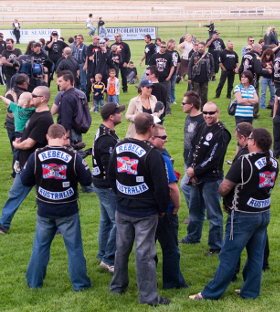Bikies take club fight to the bar
 Queensland motorcycle riders have lodged a High Court challenge against the state’s harsh anti-bikie laws.
Queensland motorcycle riders have lodged a High Court challenge against the state’s harsh anti-bikie laws.
In a campaign under the leadership of barrister Wayne Baffsky, documents have been submitted outlining arguments with over a dozen sections of the new laws.
Queensland’s anti-bikie laws include extra powers for investigators and a bikie-only prison featuring no gym facilities, no TV access, censoring of letters, monitoring of phone calls, limited visiting hours and parole only for club office-bearers who agree to cooperate with police.
Mandatory jail terms and other tough punishments breach the doctrine of the separation of powers, Baffsky’s team will argue, saying it is a clear attempt by the Queensland Government to control the state’s judiciary.
“When a person gets convicted of a particular offence under the Vicious Lawless Association Disestablishment (VLAD) Act, that person might only get a bond or a fine,” Mr Baffsky says.
“However, it is now imposed upon a judge that he or she must add 15 or 25 years to that offence... that is a very serious thing for a judge to do in circumstances where he or she is told they must do it.”
Queensland Attorney-General Jarrod Bleijie says if the laws are knoced down, they will be replaced by new ones.
“If the laws are challenged and elements are held invalid, then the Government will of course go back to the drawing board,” he said.
“However, we're not going to give up on behalf of Queenslanders to make sure that we provide the safest streets we can.”
He says the restrictive policies are working.
“At the Gold Coast, we've had a 45 per cent reduction in armed robberies and a 25 per cent reduction in assaults on individuals... that's because these gangs are too scared to go on the streets and, in their own words, they said they owned the streets”
“I would fully expect criminal gang members to challenge these laws because we're breaking their enterprise, we're cutting off their income stream,” Mr Bleijie said.
Professor Anthony Gray, a constitutional law expert from the University of Southern Queensland has told the ABC he thinks it is unlikely the High Court would overturn the mandatory sentences.
Professor Gray pointed to High Court moves last year which expanded mandatory sentences for people smugglers.
“We're talking about 15 to 25-year minimum mandatory sentences. That is way beyond what the Customs legislation found... I guess the only argument might be that these are so much more serious than the people smuggling laws,” he said.
Challenges to the right to associate may turn out differently.
“The High Court hasn't really developed so far the law on constitutional rights to association,” Dr Gray said.
“This might be an opportunity to explore in a bit more detail the extent to which people have or should have the right to associate.”
Forty-four-year-old tattooist and Hells Angels member Stefan Kuczborski has volunteered to be the test case in the appeal, saying he will likely lose his tattoo license under the new laws because he has a criminal history.
“The laws personally offend me...I think they're unnecessary, I think they're unfair and, frankly, I think they're counterproductive,” Mr Kuczborski said.
He says it is a dark reminder of his upbringing under a strict regime.
“I want to live in a democracy. I want to live in a free country... I've seen what totalitarianism does. I lived through it when I was young in Communist Poland. I just don't want to live in a society like that.
“That's why I think it's important to fight back. We should fight back against these laws, which prevent someone like me from making a living.”








 Print
Print